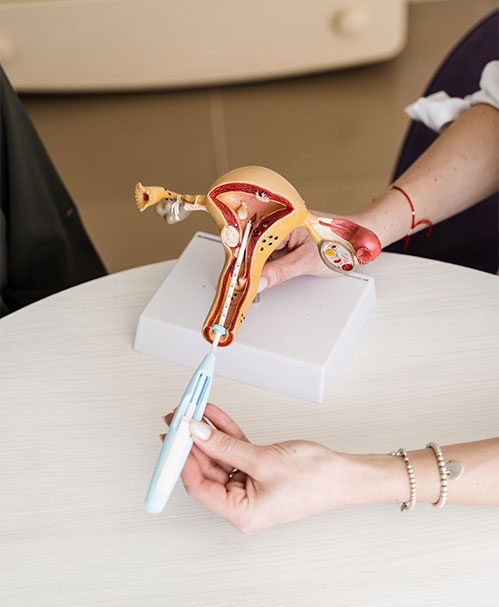Get Second Opinion | Cost Estimation | E-Consultation
Endoscopy at Hyderabad Fertility Center
Endoscopy is a minimally invasive diagnostic and surgical procedure that plays an important role in the treatment of fertility. At Hyderabad Fertility Center, we offer the best procedures of endoscopy to treat various reproductive health issues that can avoid pregnancy. Our team of fertility specialists will use advanced laparoscopy methods to increase the success rates of pregnancy.
Different Kinds of Endoscopy Procedures
1. Laparoscopy for Fertility
It is a keyhole surgery that allows doctors to examine and treat reproductive organs. This procedure is used for the following conditions.
- Diagnosing infertility causes such as blocked fallopian tubes, endometriosis or ovarian cysts.
- Removing fibroids and polyps that can be involved in pregnancy.
- Treating Polycystic Ovary Syndrome through the drilling of ovarian.
2. Hysteroscopy for Uterine Evaluation
It is a minimally invasive procedure used to examine the uterus and treat abnormalities. The Hysteroscopy procedure helps in the following conditions.
- Detecting uterine fibroids, polyps and scar tissue that affect implantation.
- Removing endometrial polyps and fibroids to improve fertility outcomes.
- Correcting uterine septum or adhesions for better embryo implantation.
Why choose us?
- Advanced Technology and Expertise: Our fertility specialists use the latest endoscopic methods and high definition imaging procedure to ensure accurate diagnosis and perfect treatment.
- Minimally Invasive Procedures: We perform scar free, pain free surgeries with faster recovery times and minimal risks.
- Higher Success Rates: Endoscopic interventions can significantly enhance your chances of conceiving naturally or through fertility treatments.
- Personalized Care and Affordable Pricing: We offer the best treatment plans for fibroid treatment with affordable endoscopic procedures for the process of fertility.
- Comprehensive Fertility Solutions: We also provide a single solution for all fertility treatments and reproductive surgeries.


When do you need Endoscopy for the treatment of fertility?
Your fertility specialist may recommend endoscopy if you experience the following.
- Unexplained infertility after multiple failed attempts to conceive.
- Repeated miscarriages due to uterine abnormalities.
- Pelvic pain or irregular menstrual cycles caused by fibroids or endometriosis.
- Tubal blockage or damage affecting egg and sperm interaction.
What to expect?
- Consultation and Diagnosis: Our fertility specialists will analyze your medical history and the best endoscopic approach will be recommended.
- Preoperative Care: You may undergo blood tests and ultrasound before the procedure.
- The Procedure: Using laparoscopy or hysteroscopy, the surgeon will diagnose and treat reproductive issues.
- Recovery and Follow up: Patients may recover within 24 to 48 hours and receive guidance after operation to enhance fertility outcomes.
Book your Endoscopy consultation today!
If you are struggling with infertility and need advanced endoscopic fertility treatments in Hyderabad, Hyderabad Fertility Center is here to help. Schedule a consultation with our expert fertility doctors today and take a step closer to your parenthood journey!
Meet Our Doctor
Dr.Swapna Chekuri
Dr. Swapna Chekuri also serves as a professor at The Deccan College of Medical Sciences. She also makes herself available amidst her busy schedules – for publishing insightful articles on advancements in reproductive medicine for leading international medical journals.
In addition, her multiple fellowships speak of her passion for continuous academic thirst and work in research and development (R&D)
Our Skills
How we help
Frequently Asked Questions
Endoscopy is a medical procedure where a doctor uses a flexible tube with a light and camera (endoscope) to examine the inside of the body, such as the digestive tract.
It is performed to diagnose and sometimes treat conditions affecting the digestive system, respiratory tract, urinary tract, and other areas.
Some common types include:
- Gastroscopy (Upper Endoscopy) – Examines the esophagus, stomach, and small intestine.
- Colonoscopy – Examines the colon and rectum.
- Bronchoscopy – Examines the lungs and airways.
- Cystoscopy – Examines the bladder.
- Laparoscopy – Examines the abdomen and pelvis.
Preparation depends on the type of endoscopy. For gastrointestinal procedures, fasting for 6-12 hours is often required. In some cases, bowel cleansing may be necessary.
Most endoscopies are not painful but may cause mild discomfort. Sedation or anesthesia is often used to ensure comfort.
The procedure typically takes 15-60 minutes, depending on the type and complexity of the examination.
It depends on the type of sedation used. Some endoscopies are performed under local anesthesia, while others involve mild to deep sedation or general anesthesia.
Yes, endoscopy is generally safe when performed by trained professionals. However, risks include bleeding, infection, and, in rare cases, perforation of the examined organ.
Common side effects include a sore throat (for upper endoscopy), bloating, mild cramping, and temporary drowsiness due to sedation.
The risk is minimal because endoscopic equipment is thoroughly sterilized between procedures.
"I confess words are not enough to express our gratitude for Hyderabad Fertility Centre—the leading fertility centre in Hyderabad—that has helped us realize our dream of becoming parents.
After having been through various failed attempts elsewhere, we were hesitant but chose to give it one last try. From our first consultation, we were convinced with the compassion extended by Dr. Swapna Chekuri and her team's expertise.
They took utmost care and explained each step clearly and were always ready to answer our doubts. The advanced technology and ethical practices spurred our confidence. Today, we are blessed with a lovely little baby, all thanks to the Hyderabad Fertility Centre.
We highly recommend them to anyone who is struggling with infertility."
"We were on an emotional roller coaster for years, trying to conceive without success. But Hyderabad Fertility Centre – the world-class IVF clinic in Hyderabad – changed our story.
Their personalized treatment plan, transparent procedures, and the support of Dr. Swapna Chekuri made all the difference. The team’s positivity and encouragement kept us strong throughout the journey.
The state-of-the-art facilities and ethical practices gave us hope, and today, we are proud parents. We can't thank the team enough for turning our dreams into reality.
If you are looking for advanced fertility solutions in Hyderabad, this is the place to be!"
"I confess words are not enough to express our gratitude for Hyderabad Fertility Centre—the leading fertility centre in Hyderabad—that has helped us realize our dream of becoming parents.
After having been through various failed attempts elsewhere, we were hesitant but chose to give it one last try. From our first consultation, we were convinced with the compassion extended by Dr. Swapna Chekuri and her team's expertise.
They took utmost care and explained each step clearly and were always ready to answer our doubts. The advanced technology and ethical practices spurred our confidence. Today, we are blessed with a lovely little baby, all thanks to the Hyderabad Fertility Centre.
We highly recommend them to anyone who is struggling with infertility."
"We were on an emotional roller coaster for years, trying to conceive without success. But Hyderabad Fertility Centre – the world-class IVF clinic in Hyderabad – changed our story.
Their personalized treatment plan, transparent procedures, and the support of Dr. Swapna Chekuri made all the difference. The team’s positivity and encouragement kept us strong throughout the journey.
The state-of-the-art facilities and ethical practices gave us hope, and today, we are proud parents. We can't thank the team enough for turning our dreams into reality.
If you are looking for advanced fertility solutions in Hyderabad, this is the place to be!"
"I confess words are not enough to express our gratitude for Hyderabad Fertility Centre—the leading fertility centre in Hyderabad—that has helped us realize our dream of becoming parents.
After having been through various failed attempts elsewhere, we were hesitant but chose to give it one last try. From our first consultation, we were convinced with the compassion extended by Dr. Swapna Chekuri and her team's expertise.
They took utmost care and explained each step clearly and were always ready to answer our doubts. The advanced technology and ethical practices spurred our confidence. Today, we are blessed with a lovely little baby, all thanks to the Hyderabad Fertility Centre.
We highly recommend them to anyone who is struggling with infertility."
"We were on an emotional roller coaster for years, trying to conceive without success. But Hyderabad Fertility Centre – the world-class IVF clinic in Hyderabad – changed our story.
Their personalized treatment plan, transparent procedures, and the support of Dr. Swapna Chekuri made all the difference. The team’s positivity and encouragement kept us strong throughout the journey.
The state-of-the-art facilities and ethical practices gave us hope, and today, we are proud parents. We can't thank the team enough for turning our dreams into reality.
If you are looking for advanced fertility solutions in Hyderabad, this is the place to be!"

